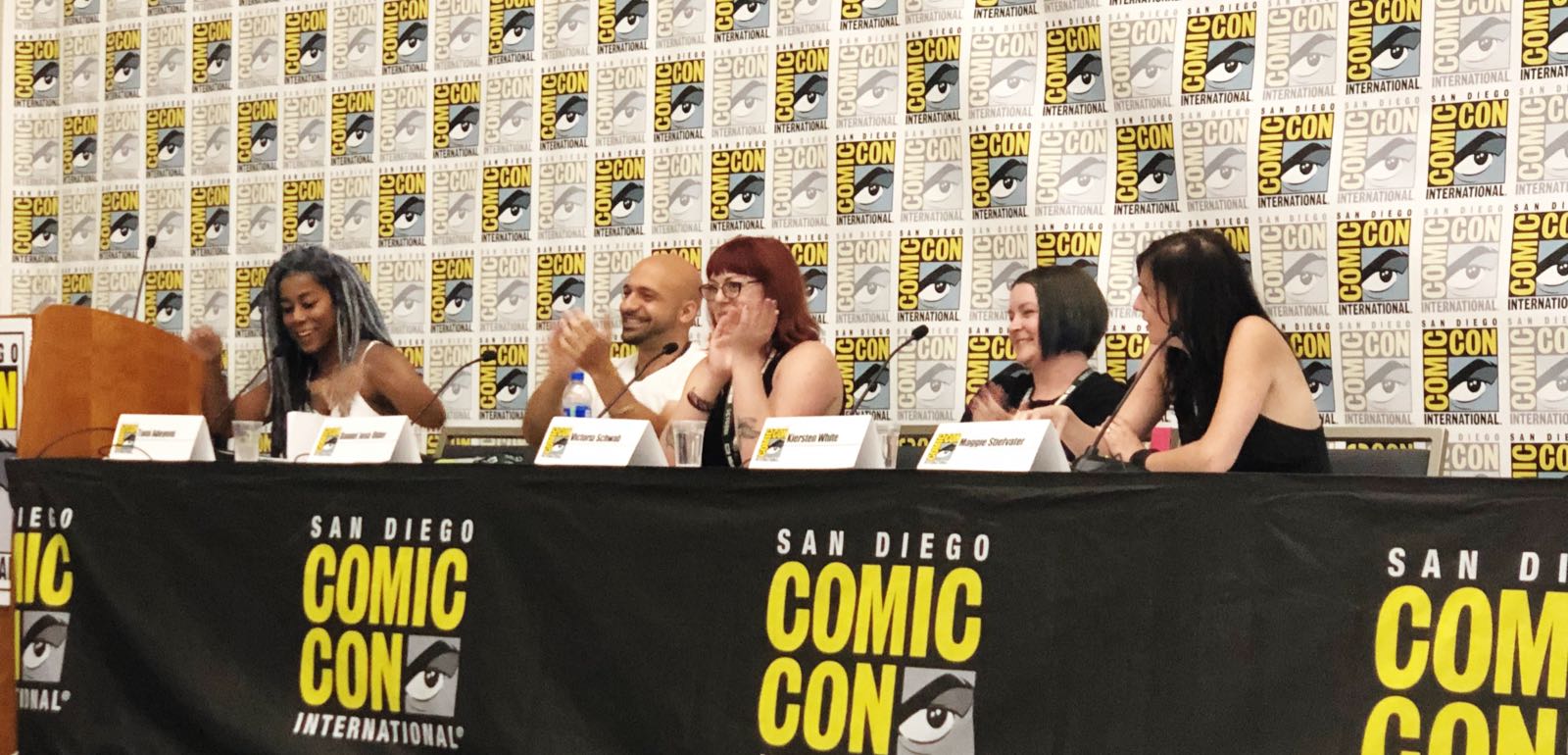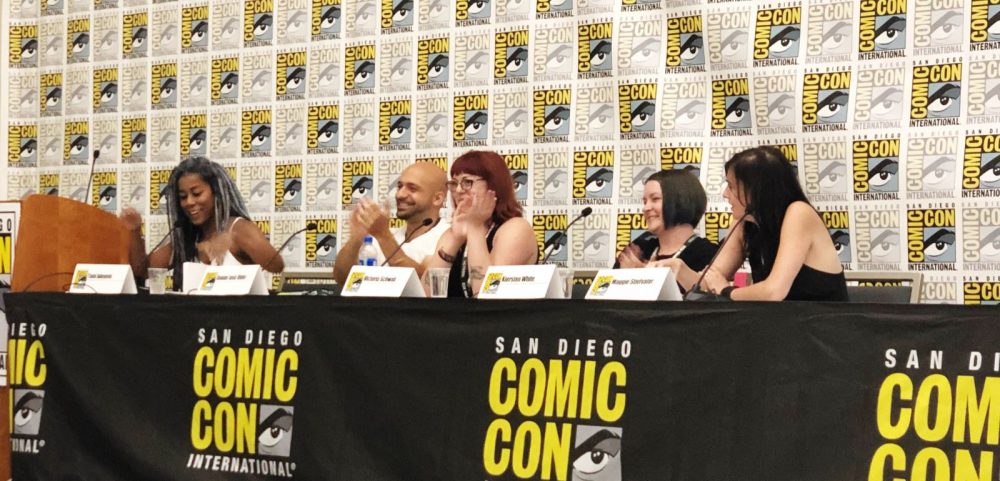The genre of fantasy for middle age children and young adults has been, in a word, explosive. It seems like ever since the emergence of J.K. Rowling’s Harry Potter some twenty years, Young Adult authors have been dominating the best sellers list with stories that delight children and adults alike. The panel ‘Let’s Get Real About Fantasy’ took some time to talk about why that is and what it says about the kinds of stories people want to read.
As seen in the photo below, moderator Tomi Adeyemi (Children of Blood and Bone) was joined by Daniel José Older (Dactyl Hill Squad), Victoria Schwab (City of Ghosts), Kiersten White (Beanstalker and Other Hilarious Scarytales) and Maggie Stiefvater (All the Crooked Saints) to talk about their craft and the importance of writing realistically for children, even in fantasy settings.
Adeyemi, whose casual and conversational approach to moderating kept everyone at ease, kicked off the panel with a real banger of a question. Turning to Older she asked about his book Dactyl Hill Squad and how it helps kids cope with trauma. Older, whose book deals with children trying to escape the racist violence of the Civil War, believes it is important to encourage folks to sit with violence and what it means.”We have to do it with a depth and thoughtfulness, the kind of which is required by the times. It’s not something you can just answer in one chapter and be done with it.”
This was a common refrain echoed by the panelists. The idea that cartoons can casually dismiss violence without ever dealing with the repercussions of actions or the impact of trauma, is something all of these authors want to confront. For authors like Victoria Schwab, it’s about embracing the darkness and turning towards it to learn about yourself . Schwab talked about how important it was for her as a young girl seeing characters like Buffy on television, characters who had to deal with issues like Post Traumatic Stress Disorder along with the realities of being a teenager. White says that you can’t bypass trauma because if you do, you miss out on the experiences these characters would have and the chance to show children how to have empathy for one another. By telling fantasy stories, these authors are giving children the chance to live, play and even be afraid in spaces that they control. They decide when to put the book down or when to pick it up, and that’s massively powerful.
White became emotional while talking about her daughter being featured in her school paper for stained glass artwork she had created for her school room. Her daughter and a friend had covered the classroom windows to protect them in case of an active shooter situation arose. The stained glass artwork would help camouflage the room so a would-be shooter would be unable to peak inside. As she reflected on this, White says that’s why it’s so important for authors and children to deal with trauma. Trauma is already a part of their everyday and learning how to deal with those emotions that we all should all be seeking to explore within ourselves and families. “These aren’t light topics but children and teenagers are really open to them. I so admire the creators that we have who are presenting these things to children and teenagers.”
The authors then took some time to talk about what it is like to be a professional writer and what it takes to survive in an always-on, always-active world. White, who wrote The Dark Descent Elizabeth Frankenstein in six days says that it is important for all writers to realize that everyone’s process looks different. Tomi Adeyemi and Older both cautioned against letting shame control how you feel about the way you work or what you write. Shame, they said, has a totally corrosive effect on the creative process. Schwab told the audience to embrace authenticity in their work,”Writing for myself, I thought, would have a narrowing effect on my audience but instead it blew the doors off.”
“Self-care is often the first thing we cast aside in the pursuit of genius and it’s not okay. ” Victoria Schwab
When it comes to writing for younger audiences the assembled group of authors wishes people would stop asking for gender specific books. There was unanimous agreement that we should approach characters with an open mind. Part of this involves reflecting on and being honest with our own internalized misogyny, sexism, and other biases we may inadvertently bring to the page as writers, readers, and consumers of popular culture.
Stiefvater notes that as long as the question regarding strong female characters keeps getting asked the march for gender equality will continue. To applause, the panelists said that it’s not about creating strong female or male characters but rather creating characters and stories that help us all reflect on the side range of emotions we have as humans. Older said one of the most important parts of his writing is to note police his characters rage and anger. Something he says we do too often in society.
The panel flew by and it felt like there was so much more to say. Still, what is remarkable about fantasy, what resonates so deeply with lovers of fantasy is that they allow us to access emotions, stories, worlds that we would never be able to visit or commune with. It’s about allowing us all the the experience and ability to go to places we may not otherwise be able to go.








